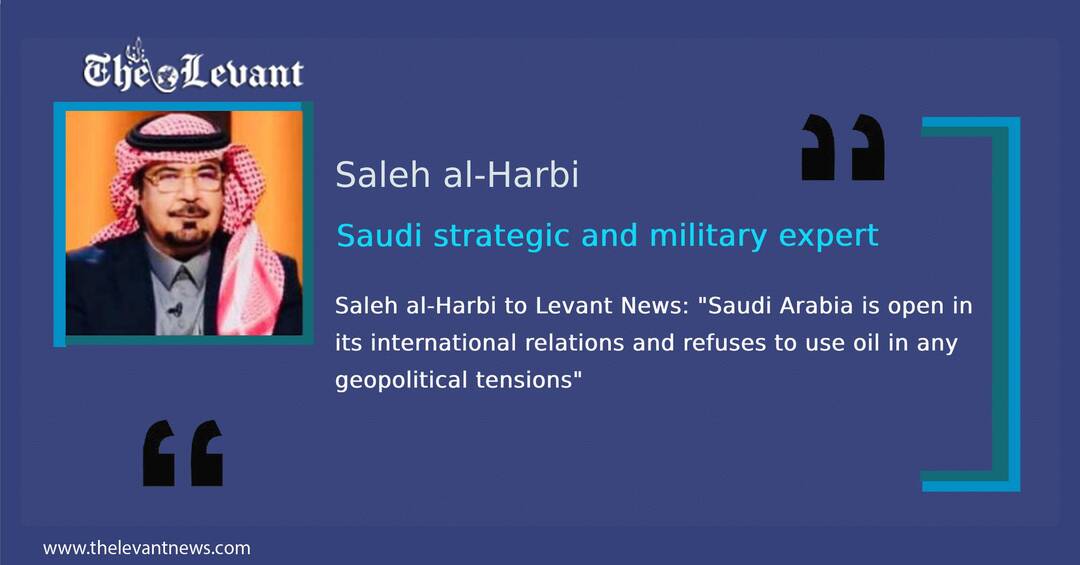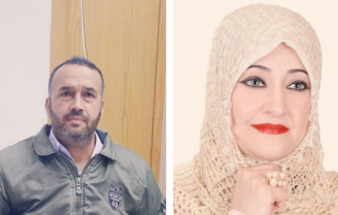-
Saleh al-Harbi to Levant News: "Saudi Arabia is open in its international relations and refuses to use oil in any geopolitical tensions"

The Saudi strategic and military expert, Major General Dr Muhammad bin Saleh Al-Harbi told Levant News that the Yemeni crisis is strategically related to Iran which uses it to serve its interests and negotiate with the West. Therefore, Iran is well aware of its tools and militias in the region, especially the Houthi militias in Yemen, which it uses to pressurise the West to make the greatest gains at the negotiating table.
"Since 1979, Iran's policy was aimed at destabilizing the region. After 2011, Iran has moved to several hot spots in Iraq, Syria, Yemen and Lebanon, through its militias to threaten peace and security in those countries," he explained. "With an objective analysis of the events over the past years, we will only find destruction and threats in all regions that witnessed blatant interventions by the Iranian regime. Accordingly, the KSA is moving with all its history and vision of its foreign policies, interim goals and future visions to achieve its political and development goals and ensure regional security and stability," he added.
"The Arab countries have to outline a comprehensive vision to control the ME regional security especially since we are witnessing many sharp changes in international politics and the formation of blocs and alliances that will absolutely lead to the emergence of international powers in the future," he pointed out.
Here is the script of the other questions in the interview
* The UN Special Envoy to Yemen Hans Grundberg announced on April 2 that a two-month truce in Yemen came into force. Saudi Arabia and Iran welcomed the truce that was secured by the UN mediation. The truce can be renewed once the two months are up, provided the sides agree. What do you think are the most likely scenarios to come as a result of this truce?
This pioneering initiative supports and completes the previous GCC initiatives 2011, Geneva 2015, Kuwait 2016, Riyadh 2019, Oman 2020. Everyone wants the March-2021 Saudi initiative for ending the Yemeni crisis and reaching a comprehensive political solution to be based on a strategic concept, not on a tactic and temporary one. This truce serves as a starting point and a roadmap not only to stop the war and military operations in most of Yemen but also to provide the Yemenis with a new way of life.
We can say all scenarios are open according to where global events will go and what repercussions they will have on the region especially the conflict between America and Russia and its tactical repercussions on Iran's policies and choices for levels of movement with Moscow and Washington as well as the fate of its nuclear deal with the West.
* The Houthi militia is acting as an agent for Tehran in a critical geopolitical region. Do you think the Houthis will violate the truce and what are the consequences of that in case it happened?
What I can say in this regard is that you cannot trust the Houthi militias will abide by any agreement whether politically or militarily because they are backed by Iran to fulfil its international & regional aims, therefore, all scenarios are open whether a commitment that respects the humanitarian and moral dimension might happen, especially at this stage, or a new breach of the truce that makes the Yemeni citizens' lives harder might do.
In this regard, it is worth mentioning that any possible breach of the truce will make developments on the ground and political ones in the Vienna talks and will be used by Tehran as pressure on the US.
The KSA stresses it respects international law and the Yemeni people's right to have peace and stability, bearing in mind the KSA's right to preserve its sovereignty and security.
* The Russian-Ukrainian war drives everybody to talk about new forces to confront the USA, which will be positioned where the USA left a power vacuum. How much do you think this happens on the ground?
Everyone knows and understands the US strategic vision is moving away from the ME (Middle East) towards the South China Sea because of strategic competition and indicators of the threat posed by Russia and China, the thing that has resulted in a political vacuum in several hot spots which were exploited later in a way or another by Russia to harass the US politically and increase its strategic power in front of the US one.
In light of this, you can notice well the US administration's moves against Russia in the Ukrainian war and how it watches and pressurises to control China's pace towards these moves. This guarantees the balance of its strategic goals within the framework of its alliances against the Russian and Chinese threats.
Therefore, we can say the geopolitical tensions are multiple and complex in more than one issue, which leads to very complex situations that push everyone to watch the world standing on its tiptoes.
* How does the KSA view these developments, especially regarding its relations with the USA, Russia and China?
It is important to say that the KSA looks strategically at all the political global changes, the sharp shifts in the international and regional relations and the new alliances emerging as a logical result and a clear reflection of those changes in international relations.
Therefore, the KSA has a broad and open horizon for its international relations and alliances whether with the USA, Russia or China. Accordingly, Riyadh adopts a major principle based on not using oil, the world's first strategic commodity, in any geopolitical tensions since oil is a well-established and inherent value in the KSA's foreign policy.
Therefore, according to the directives of the Custodian of the Two Holy Mosques and His Highness the Crown Prince, Saudi foreign policy works to reduce the tensions through communication with all concerned parties.
* President Biden's administration wants to complete the nuclear deal with Tehran and there are indications that the IRGC (Islamic Revolutionary Guard Corps) will be removed from the list of terrorism. Do you think this is possible?
I think the USA wants to finish the Middle East issues, including Iran and its nuclear deal.
At this point, we should point out that the concessions, made by the US administration to Iran, specifically on removing the IRGC from the terrorist list, it will not go like that and it will cost the US policy very much internally and externally, especially with the KSA & the UAE.
You May Also Like
Popular Posts
Caricature
BENEFIT AGM approves 10%...
- March 27, 2025
BENEFIT, the Kingdom’s innovator and leading company in Fintech and electronic financial transactions service, held its Annual General Meeting (AGM) at the company’s headquarters in the Seef District.
During the meeting, shareholders approved all items listed on the agenda, including the ratification of the minutes of the previous AGM held on 26 March 2024. The session reviewed and approved the Board’s Annual Report on the company’s activities and financial performance for the fiscal year ended 31 December 2024, and the shareholders expressed their satisfaction with the company’s operational and financial results during the reporting period.
The meeting also reviewed the Independent External Auditor’s Report on the company’s consolidated financial statements for the year ended 31 December 2024. Subsequently, the shareholders approved the audited financial statements for the fiscal year. Based on the Board’s recommendation, the shareholders approved the distribution of a cash dividend equivalent to 10% of the paid-up share capital.
Furthermore, the shareholders endorsed the allocation of a total amount of BD 172,500 as remuneration to the members of the Board for the year ended 31 December 2024, subject to prior clearance by related authorities.
The extension of the current composition of the Board was approved, which includes ten members and one CBB observer, for a further six-month term, expiring in September 2025, pending no objection from the CBB.
The meeting reviewed and approved the Corporate Governance Report for 2024, which affirmed the company’s full compliance with the corporate governance directives issued by the CBB and other applicable regulatory frameworks. The AGM absolved the Board Members of liability for any of their actions during the year ending on 31st December 2024, in accordance with the Commercial Companies Law.
In alignment with regulatory requirements, the session approved the reappointment of Ernst & Young (EY) as the company’s External Auditors for the fiscal year 2025, covering both the parent company and its subsidiaries—Sinnad and Bahrain FinTech Bay. The Board was authorised to determine the external auditors’ professional fees, subject to approval from the CBB, and the meeting concluded with a discussion of any additional issues as per Article (207) of the Commercial Companies Law.
Speaking on the company’s performance, Mr. Mohamed Al Bastaki, Chairman BENEFIT , stated: “In terms of the financial results for 2024, I am pleased to say that the year gone by has also been proved to be a success in delivering tangible results. Growth rate for 2024 was 19 per cent. Revenue for the year was BD 17 M (US$ 45.3 Million) and net profit was 2 Million ($ 5.3 Million).
Mr. Al Bastaki also announced that the Board had formally adopted a new three-year strategic roadmap to commence in 2025. The strategy encompasses a phased international expansion, optimisation of internal operations, enhanced revenue diversification, long-term sustainability initiatives, and the advancement of innovation and digital transformation initiatives across all service lines.
“I extend my sincere appreciation to the CBB for its continued support of BENEFIT and its pivotal role in fostering a stable and progressive regulatory environment for the Kingdom’s banking and financial sector—an environment that has significantly reinforced Bahrain’s standing as a leading financial hub in the region,” said Mr. Al Bastaki. “I would also like to thank our partner banks and valued customers for their trust, and our shareholders for their ongoing encouragement. The achievements of 2024 set a strong precedent, and I am confident they will serve as a foundation for yet another successful and impactful year ahead.”
Chief Executive of BENEFIT; Mr. Abdulwahed AlJanahi commented, “The year 2024 represented another pivotal chapter in BENEFIT ’s evolution. We achieved substantial progress in advancing our digital strategy across multiple sectors, while reinforcing our long-term commitment to the development of Bahrain’s financial services and payments landscape. Throughout the year, we remained firmly aligned with our objective of delivering measurable value to our shareholders, strategic partners, and customers. At the same time, we continued to play an active role in enabling Bahrain’s digital economy by introducing innovative solutions and service enhancements that directly address market needs and future opportunities.”
Mr. AlJanahi affirmed that BENEFIT has successfully developed a robust and well-integrated payment network that connects individuals and businesses across Bahrain, accelerating the adoption of emerging technologies in the banking and financial services sector and reinforcing Bahrain’s position as a growing fintech hub, and added, “Our achievements of the past year reflect a long-term vision to establish a resilient electronic payment infrastructure that supports the Kingdom’s digital economy. Key developments in 2024 included the implementation of central authentication for open banking via BENEFIT Pay”
Mr. AlJanahi concluded by thanking the Board for its strategic direction, the company’s staff for their continued dedication, and the Central Bank of Bahrain, member banks, and shareholders for their valuable partnership and confidence in the company’s long-term vision.
opinion
Report
ads
Newsletter
Subscribe to our mailing list to get the new updates!






















